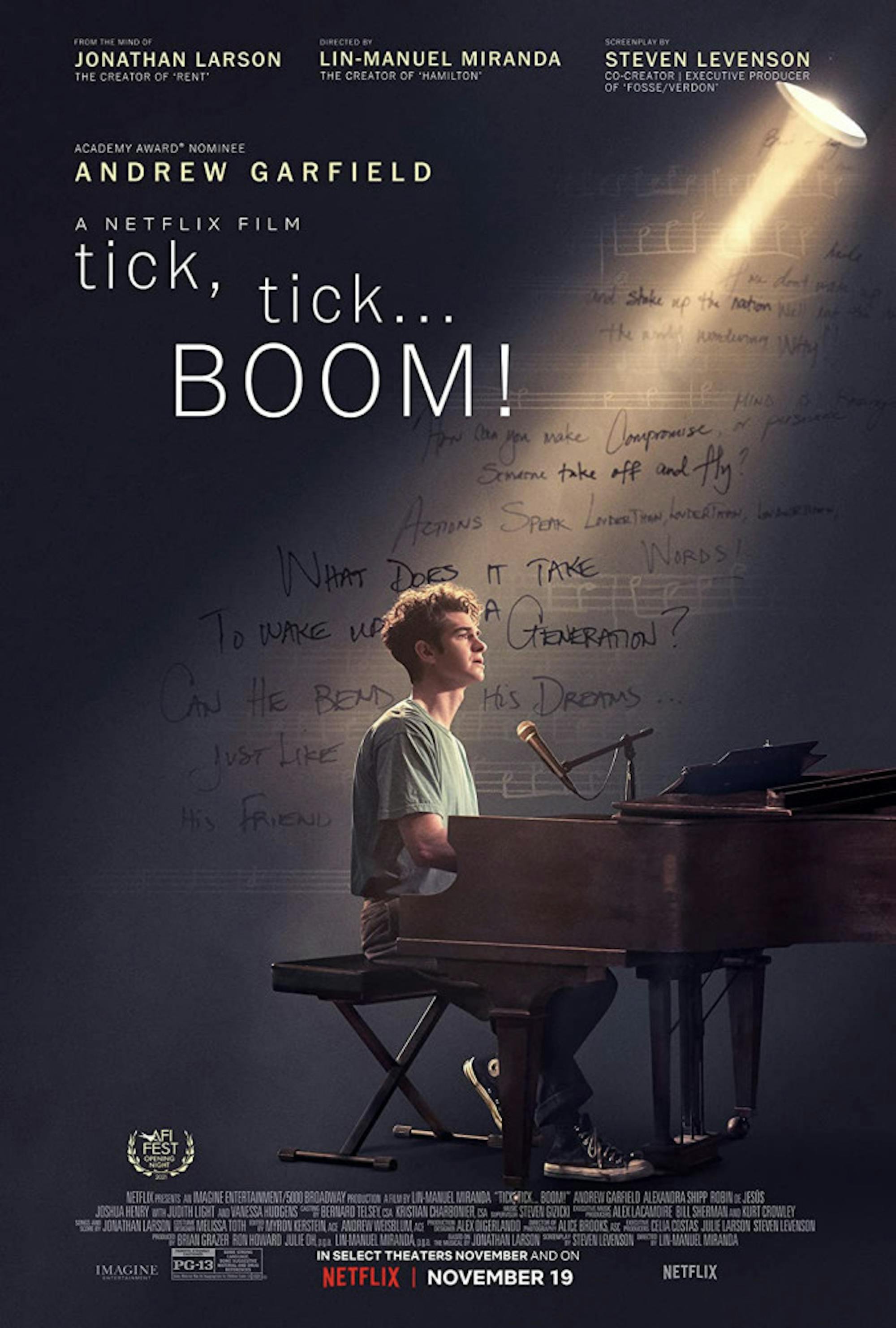On Nov. 26, legendary musical theater composer Stephen Sondheim died. Sondheim leaves behind a changed fate for the modern musical, having reinvented the standard with classics such as “Into The Woods” (1987), “Company” (1970) and “West Side Story” (1957). Just a week before Sondheim’s passing, “Tick, Tick… Boom!” was released on Netflix. The film celebrates musical theater and composers, namely through the original writer Jonathan Larson. These two consecutive events call on us to reminisce upon the icons of composition and reinvestigate the simple joys of live theater.
“Tick, Tick… Boom!” stems from the original stage musical by Jonathan Larson, famed musical theater writer and creator of “Rent” (1996). The film follows Larson himself, played by Andrew Garfield, as he attempts to write and produce his musical “Superbia." After years of struggling to find a home for his musical, Larson finally secured a workshop with a small theater company that may lead to investments. The film chronicles the days leading up to this workshop, in which Larson destroys and (sometimes) rebuilds his friendships. Told partly in the present and partly in flashback, the film details the writing experience and exemplifies just how far the need for artistic achievement may push someone.
The film honors musical theater, but even more specifically the composition process. Larson is pictured in the throes of writing, putting every dollar and ounce of himself into his musical. The broader message is clear: A musical is not some off-handed art piece but always a passion project. Writers put their whole beings into their musicals and thus take the greatest risk when they put their work up for commercial review. The process is emotionally draining and can lead many to ravage their friendships. This is particularly true of Larson; in writing "Superbia," Larson becomes emotionally unavailable to his girlfriend Susan (Alexandra Shipp), is not able to properly support his best friend Michael (Robin de Jesús) in crisis and even fails to pay his own power bill. Larson makes towering sacrifices for his art and must come to an emotional reckoning with just how much of himself he is willing to give up for the writing process.
In the wake of Sondheim’s passing, one sequence of the film holds special significance. For the original stage version of “Tick, Tick… Boom!” Larson wrote a song titled “Sunday” about the brunch rush of the Moondance Diner for which he worked as a waiter. The song parodied the famous Act 1 finale “Sunday” from Sondheim’s “Sunday in the Park with George” (1984). For the film, director Lin-Manuel Miranda used this song as an opportunity to feature the theater community and to specifically reference modern musical theater. The song has a myriad of cameos, including Chita Rivera, Bebe Neuwirth and the original Dot in “Sunday in the Park with George,”Bernadette Peters. Further, the sequence also includes original “Rent” cast members Adam Pascal, Daphne Rubin-Vega and Wilson Jermaine Heredia. The sequence pays homage to Sondheim and his legacy, while also referencing modern theater and how far it has come.
Sondheim is even a character within the film, providing a direct link to his legacy and standing within the theatrical canon. Played by Bradley Whitford, Sondheim is pictured as a mentor figure to Larson. Sondheim was the first to support Larson in a private critique of “Superbia” and is even pictured as coming to the momentous “Superbia” workshop. This portrayal of Sondheim himself is important in establishing the passed-down legacy of musical theater. Oscar Hammerstein II first mentored Sondheim, who then went on to mentor Jonathan Larson. Although Larson died before he had the opportunity to mentor any newer writers, he has clearly inspired many, including the director of the film, Lin-Manuel Miranda. Though it may sound cliche, theater is a family. The skills of composition have made their way through generations, finding new hands even in the present day.
Theater is a gift, and its legacy must be celebrated. In the case of “Tick, Tick… Boom!” the film is a celebration of exactly that history. The film remembers the lost greats of musical theater, both in the form of Jonathan Larson and Stephen Sondheim, and pays deep homage to the works that they have created. For those new to theater, the film is a compelling narrative about struggle and genius within the arts. For theater lovers, the film is a deeply cathartic viewing experience. Sondheim himself recorded a voicemail featured in the movie, commenting on Larson’s musical, “It’s first-rate work and has a future, and so do you. I’ll call you later with some thoughts, if that’s OK. Meanwhile, be proud.” The message is all too true of the film itself. It’s first-rate work and has brought deep pride to the legacy of theater.






